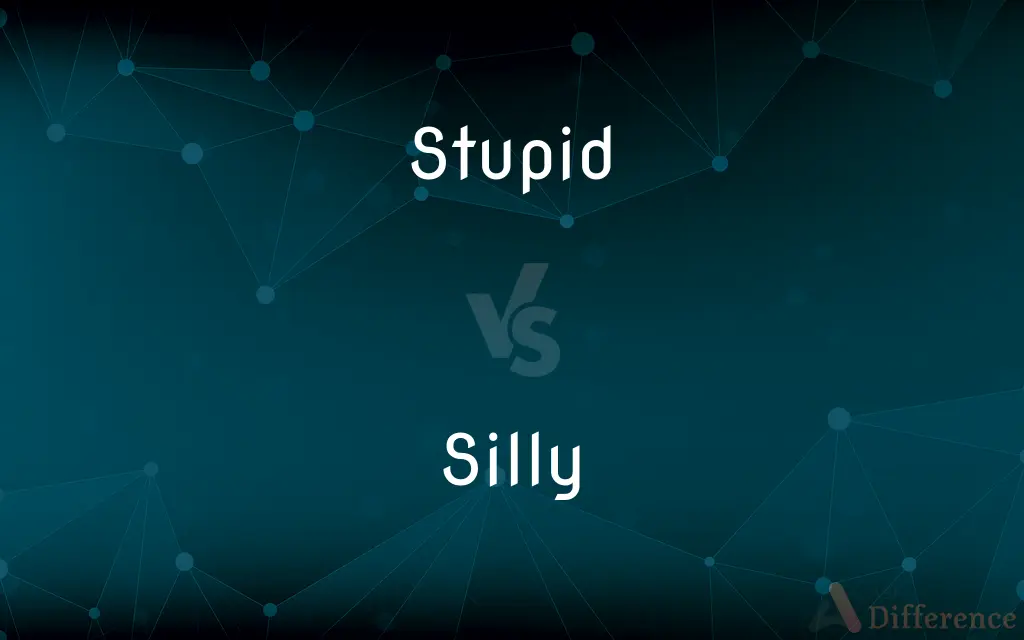Stupid vs. Silly — What's the Difference?
Edited by Tayyaba Rehman — By Urooj Arif — Updated on March 27, 2024
Stupid implies a lack of intelligence or common sense, while silly suggests a lack of seriousness or thoughtfulness.

Difference Between Stupid and Silly
Table of Contents
ADVERTISEMENT
Key Differences
Stupid refers to a more severe and sometimes offensive characterization of a person's intelligence or actions, indicating a significant lack of understanding or common sense. It often carries a negative connotation, suggesting an inability to learn or adapt. On the other hand, silly is generally lighter in tone, pointing to behavior or actions that are not serious, thoughtful, or are playfully nonsensical. It's less about a lack of intelligence and more about a momentary lapse in judgment or seriousness.
While "stupid" can be used to harshly criticize someone's decision-making abilities or intelligence, labeling actions or decisions as silly usually implies a temporary and often forgivable lapse in judgment. Silly actions are often seen as endearing or humorous, whereas stupid actions might be viewed as concerning or indicative of deeper issues.
Silly often has a more forgiving and playful connotation, associated with moments of fun, creativity, or lightheartedness. It can be used affectionately to describe someone's quirks or humorous behavior. In contrast, calling someone or something stupid is rarely seen in a positive light and can hurt relationships or self-esteem.
In educational or developmental contexts, distinguishing between silly and stupid is important. Educators and parents might address silly behavior as a natural part of learning and exploring boundaries, while labeling behavior or individuals as stupid can be harmful and discouraging, impacting a person's learning and confidence.
The social acceptability of these terms varies greatly; "silly" can be used in a playful, affectionate manner, while "stupid" is often seen as insulting or derogatory. The impact of these words goes beyond their definitions, influencing perceptions, interactions, and personal relationships.
ADVERTISEMENT
Comparison Chart
Connotation
Negative, lack of intelligence
Light-hearted, lack of seriousness
Severity
More severe and offensive
Less severe, often seen as endearing
Context of Use
Criticism of intelligence or common sense
Playful or humorous behavior
Impact on Relationships
Can be damaging or hurtful
Generally seen as harmless or affectionate
Educational Implications
Can discourage learning and confidence
Can be a natural part of exploring and learning
Compare with Definitions
Stupid
Insulting someone’s intelligence.
Calling someone stupid is hurtful and unnecessary.
Silly
Showing a lack of seriousness or thoughtfulness.
The movie was full of silly jokes.
Stupid
Characterizing poor decision-making.
Investing without research was a stupid decision.
Silly
Playfully nonsensical or humorous.
We spent the evening telling silly stories.
Stupid
Actions or ideas showing a lack of understanding.
Ignoring expert advice is stupid.
Silly
Temporary lapse in judgment.
It was a silly mistake, but we learned from it.
Stupid
Reflecting on inability to learn or adapt.
Repeating the same mistakes is stupid.
Silly
Affectionately foolish or lighthearted.
She has a silly side that everyone loves.
Stupid
Lacking intelligence or common sense.
It was a stupid mistake to ignore the warning signs.
Silly
Engaging in playful or fun behavior.
The game encouraged us to be as silly as possible.
Stupid
Slow to learn or understand; obtuse.
Silly
Having or showing a lack of common sense or judgement; absurd and foolish
Another of his silly jokes
‘Don't be silly!’ she said
Stupid
Tending to make poor decisions or careless mistakes.
Silly
(especially of a woman, child, or animal) helpless; defenceless.
Stupid
Marked by a lack of intelligence or care; foolish or careless
A stupid mistake.
Silly
Denoting fielding positions very close to the batsman
Silly mid-on
Stupid
Dazed, stunned, or stupefied
Felt stupid after taking the pain medication.
Silly
A foolish person (often used as a form of address)
Come on, silly
Stupid
Used to express disparagement or exasperation
Take your stupid notebook and go home.
Silly
Having or exhibiting a lack of good judgment or common sense; foolish.
Stupid
A stupid or foolish person.
Silly
Lacking seriousness or responsibleness; frivolous
Indulged in silly word play.
Silly pet names for each other.
Stupid
Lacking in intelligence or exhibiting the quality of having been done by someone lacking in intelligence.
Because it's a big stupid jellyfish!
Silly
Semiconscious; dazed
Knocked silly by the impact.
Stupid
To the point of stupor.
Neurobiology bores me stupid.
Silly
Laughable or amusing through foolishness or a foolish appearance.
Stupid
(archaic) Characterized by or in a state of stupor; paralysed.
Silly
(of numbers, particularly prices) Absurdly large.
Stupid
(archaic) Lacking sensation; inanimate; destitute of consciousness; insensate.
Silly
Blessed, particularly:
Stupid
Dulled in feeling or sensation; torpid.
Silly
Good; pious.
Stupid
(slang) Amazing.
That dunk was stupid! His head was above the rim!
Silly
Holy.
Stupid
(slang) Darn, annoying.
I fell over the stupid wire.
Silly
Pitiful, inspiring compassion, particularly:
Stupid
(slang) Extremely.
My gear is stupid fly.
Silly
Innocent; suffering undeservedly, especially as an epithet of lambs and sheep.
Stupid
A stupid person; a fool.
Silly
Helpless, defenseless.
Scared silly
Stupid
The condition or state of being stupid; stupidity, stupidness.
His stupid knows no bounds.
Silly
Insignificant, worthless, especially with regard to land quality.
Stupid
Very dull; insensible; senseless; wanting in understanding; heavy; sluggish; in a state of stupor; - said of persons.
O that men . . . should be so stupid grown . . . As to forsake the living God!
With wild surprise,A moment stupid, motionless he stood.
Silly
Weak, frail; flimsy use concerning people and animals is now obsolete.
Stupid
Resulting from, or evincing, stupidity; formed without skill or genius; dull; heavy; - said of things.
Observe what loads of stupid rhymesOppress us in corrupted times.
Silly
Sickly; feeble; infirm.
Stupid
A person who is not very bright;
The economy, stupid!
Silly
Simple, plain, particularly:
Stupid
Lacking or marked by lack of intellectual acuity
Silly
Rustic, homely.
Stupid
In a state of mental numbness especially as resulting from shock;
He had a dazed expression on his face
Lay semiconscious, stunned (or stupefied) by the blow
Was stupid from fatigue
Silly
(obsolete) Lowly, of humble station.
Stupid
Without much intelligence;
A dull job with lazy and unintelligent co-workers
Silly
Mentally simple, foolish, particularly:
Silly
(obsolete) Rustic, uneducated, unlearned.
Silly
Thoughtless, lacking judgment.
Silly
(Scottish) Mentally retarded.
Silly
Stupefied, senseless; stunned or dazed.
Silly
Very close to the batsman, facing the bowler; closer than short.
Silly
Sillily: in a silly manner.
Silly
(colloquial) A silly person.
Silly
A term of address.
Silly
(colloquial) A mistake.
Silly
Happy; fortunate; blessed.
Silly
Harmless; innocent; inoffensive.
The silly virgin strove him to withstand.
A silly, innocent hare murdered of a dog.
Silly
Weak; helpless; frail.
After long storms . . . With which my silly bark was tossed sore.
The silly buckets on the deck.
Silly
Rustic; plain; simple; humble.
A fourth man, in a sillyhabit.
All that did their silly thoughts so busy keep.
Silly
Weak in intellect; destitute of ordinary strength of mind; foolish; witless; simple; as, a silly woman.
Silly
Proceeding from want of understanding or common judgment; characterized by weakness or folly; unwise; absurd; stupid; as, silly conduct; a silly question.
Silly
A word used for misbehaving children;
Don't be a silly
Silly
Pungent adjectives of disesteem;
Gave me a cockamamie reason for not going
Wore a goofy hat
A silly idea
Some wacky plan for selling more books
Silly
Lacking seriousness; given to frivolity;
A dizzy blonde
Light-headed teenagers
Silly giggles
Silly
Inspiring scornful pity;
How silly an ardent and unsuccessful wooer can be especially if he is getting on in years
Silly
Dazed from or as if from repeated blows;
Knocked silly by the impact
Slaphappy with exhaustion
Common Curiosities
Can calling someone stupid have negative effects?
Yes, it can be hurtful and damaging, potentially affecting the person's self-esteem and relationships.
How should educators address stupid vs. silly behavior in classrooms?
Educators should avoid labeling students or actions as stupid due to its negative implications, and instead address silly behavior as a normal part of learning and creativity.
Can silly behavior be beneficial?
Yes, engaging in silly behavior can foster creativity, relieve stress, and enhance social bonds.
What distinguishes stupid from silly behavior?
Stupid behavior indicates a lack of intelligence or common sense, while silly behavior is characterized by a lack of seriousness, often in a playful or humorous context.
Is silly behavior always negative?
No, silly behavior is often seen as endearing, fun, and a natural part of lighthearted interactions.
Is it ever appropriate to use the term stupid?
While it can be used to describe actions or decisions, it's important to be mindful of its harsh connotation and potential to harm others.
What role does intent play in differentiating stupid from silly?
Intent is key; silly actions are typically done with playful or humorous intent, while stupid actions may stem from a genuine lack of understanding or consideration.
Can the label of stupid be motivating in any context?
While it can sometimes motivate individuals to prove others wrong, it's generally more discouraging than helpful.
How do cultural perceptions of stupid and silly differ?
Cultural perceptions can vary, but generally, silly is more universally accepted as harmless, while stupid can be seen as a more serious insult.
Why is it important to differentiate between stupid and silly in communication?
To avoid misunderstandings and to communicate in a way that is respectful and appropriate to the context.
Can someone be smart and still do something stupid?
Yes, everyone can make poor decisions or mistakes, regardless of their overall intelligence.
How do people's reactions to being called stupid vs. silly differ?
Being called stupid often elicits defensive or hurt reactions, while being called silly can be taken lightly or even as a compliment.
Is it possible for an action to be both stupid and silly?
Yes, actions can be both if they lack seriousness and common sense, though the context and perception will greatly influence how they're classified.
How can someone recover from making a stupid decision?
By learning from the experience, seeking advice or education, and making more informed decisions in the future.
Share Your Discovery

Previous Comparison
Pillowslip vs. Pillowcase
Next Comparison
Warfare vs. BattleAuthor Spotlight
Written by
Urooj ArifUrooj is a skilled content writer at Ask Difference, known for her exceptional ability to simplify complex topics into engaging and informative content. With a passion for research and a flair for clear, concise writing, she consistently delivers articles that resonate with our diverse audience.
Edited by
Tayyaba RehmanTayyaba Rehman is a distinguished writer, currently serving as a primary contributor to askdifference.com. As a researcher in semantics and etymology, Tayyaba's passion for the complexity of languages and their distinctions has found a perfect home on the platform. Tayyaba delves into the intricacies of language, distinguishing between commonly confused words and phrases, thereby providing clarity for readers worldwide.















































